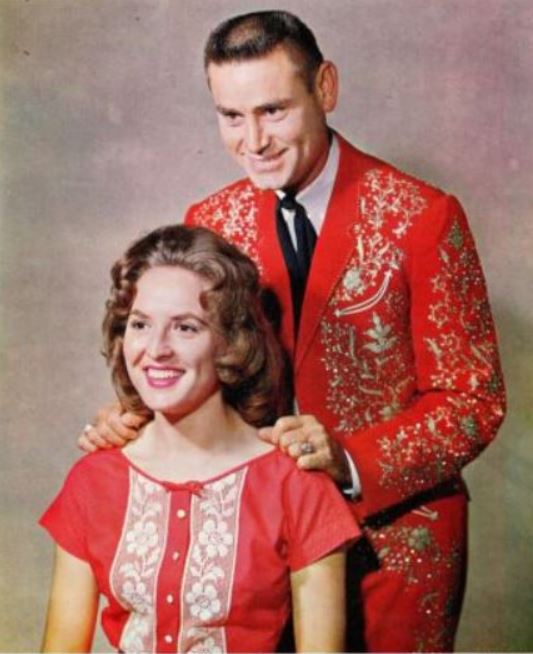
Nashville and the broader country music community recently mourned the passing of Melba Montgomery, a true artisan whose voice and songwriting profoundly shaped the genre’s golden age. Regarded as one of the greatest female stylists of her generation, Montgomery, who died at 86, leaves behind a monumental legacy as both a matchless vocalist and an enduring songwriting talent. Her contributions ranged from immortalizing country classics to forging groundbreaking duet partnerships that redefined vocal chemistry in country music.
Montgomery’s career was characterized by a rare versatility, allowing her to seamlessly transition between the raw emotion of honky-tonk duets and the poignant storytelling of solo ballads. While she is celebrated for her powerful solo No. 1 hit, “No Charge,” it was her captivating collaborations, particularly with George Jones, that cemented her status as an icon. Her distinctive “drawling, soulful, Southern-accented phrasing” provided the perfect counterpoint to her partners, creating an electrifying intensity that resonated deeply with audiences.
This article embarks on a comprehensive journey through Melba Montgomery’s remarkable life and career, chronicling the pivotal moments and enduring achievements that solidified her place in country music history. From her humble beginnings in rural Tennessee to her rise as a celebrated performer and songwriter, we will explore the multifaceted talents of an artist whose influence continues to reverberate through the heart of country music.
1. **Early Life and Musical Roots**Melba Joyce Montgomery’s journey into country music began, quite literally, from the ground up, born in Iron City, Tennessee, in 1938. She was raised near Florence, Alabama, amidst a family deeply embedded in musical traditions. Her father, a farmer, also cultivated a love for music, playing the fiddle and guitar, and teaching singing in the local Methodist Church, which became young Melba’s first stage.
It was an upbringing steeped in sound, where music was not just entertainment but an integral part of daily life. Melba received her first guitar at the tender age of 10, a gift that would prove foundational to her future career. In a household of seven children, harmonies were a constant, and instruments like the banjo, fiddle, and guitar were common companions, played by all.
This vibrant, musical environment fostered a natural talent that extended beyond Melba. Her brothers, Carl and Earl “Peanut” Montgomery, also followed suit, becoming successful country songwriters in their own right. This shared passion and talent laid a strong groundwork for Melba’s own aspirations, shaping her understanding of country music’s intricate narrative and melodic structures from a very early age.
Read more about: Folk Singer’s Principled Stand Against JD Vance Appearance Ignites Global Dialogue and Overwhelming Support
2. **Discovery and Apprenticeship with Roy Acuff**At the pivotal age of 19, Melba Montgomery took a decisive step toward her professional career, traveling to Nashville, the very heart of country music. There, she entered a talent contest organized by WSM radio, the legendary home of the Grand Ole Opry. Her undeniable talent shone brightly, leading her to win the competition.
Her performance captivated a formidable judge: Roy Acuff, an undeniable titan of the Grand Ole Opry. So impressed was Acuff by Montgomery’s vocal prowess that he extended a career-defining invitation, asking her to join his touring troupe as the “girl singer.” This marked the beginning of a crucial apprenticeship that would shape her artistry for years to come.
Montgomery remained with Acuff’s esteemed show for the next four years, from 1958 until 1962. During this period, she honed her performance skills, learned the intricacies of the road, and absorbed invaluable lessons from one of country music’s most respected figures. Her initial recording sessions were even as a harmony vocalist on Acuff’s records for the Hickory label, providing her with essential studio experience before embarking on her solo and duet breakthroughs.
3. **Landmark Duets with George Jones – The Initial Breakthrough**Melba Montgomery’s recording career truly began to flourish in the early 1960s. After recording her first solo efforts for the Nugget label in 1962, a pivotal moment arrived when she signed with United Artists Records in 1963. It was a connection through country music royalty that truly launched her into the national spotlight.
George Jones, already a formidable presence on the United Artists roster, was instrumental in her signing, having discovered her music and personally persuaded producer Pappy Daily to bring her aboard. This serendipitous connection led to an immediate and electrifying collaboration, as Montgomery was teamed with Jones for a series of duets that would become legendary.
Their first joint effort, and a significant milestone for Montgomery, was the 1963 hit, “We Must Have Been Out of Our Minds.” Remarkably, Montgomery herself penned this song, which quickly ascended to number three on the American Billboard Hot Country Songs chart. This single was not merely a hit; it was Montgomery’s breakout recording, introducing her unique vocal blend to a national audience and setting the stage for one of country music’s most revered duet partnerships.
4. **Defining a Duet Legacy: The Chemistry with George Jones**The vocal alchemy between Melba Montgomery and George Jones was instantly recognized as something special, a perfect storm of distinctive styles. Jones, known for his signature “bent-note vocals,” found an ideal counterpart in Montgomery’s “drawling, soulful, Southern-accented phrasing.” Together, they produced a sound filled with “electrifying intensity” that resonated deeply with country music aficionados.
Their partnership extended well beyond their initial hit, yielding five more chart entries between 1964 and 1967. These included memorable tracks like “Let’s Invite Them Over,” “What’s in Our Heart,” “Please Be My New Love,” “Multiply the Heartaches,” and “Party Pickin’.” Their songs often explored the complex emotional landscapes of relationships, from infidelity to the comedic aspects of marital conflicts, all delivered with Montgomery’s signature Appalachian vocal harmonies.
Over the course of their collaboration, Jones and Montgomery released six duet albums, with Montgomery herself writing or co-writing a dozen songs for these projects, including ‘Simply Divine,” “Until Then,” and “Lovin’ on Easy Street.” Critics were effusive in their praise; Stephen Thomas Erlewine of AllMusic would later observe that their songs “illustrate how well-suited the pair was for each other,” going so far as to suggest Montgomery was “Jones’ best duet partner.” Montgomery herself expressed profound gratitude, recalling, “It was such an honor to get to record and work shows with him. I’ve been very very blessed through my career.” This period solidified her reputation as a formidable and indispensable duet artist.
5. **Early Solo Endeavors and Chart Presence**While Melba Montgomery’s name became synonymous with her electrifying duet partnerships, she also diligently pursued a solo career, demonstrating her independent artistic vision. Her earliest solo recordings were made for Lonzo & Oscar’s Nugget Records in 1962, laying the groundwork for her individual chart aspirations.
By 1963, concurrent with her breakthrough duets with George Jones, Montgomery made her solo debut on the country charts with “Hall of Shame.” That same year, another solo effort, “The Greatest One of All,” further proved her individual appeal, with both singles reaching the top 30 on the Billboard country songs chart. These early solo successes showcased her ability to carry a song with her unique vocal styling, even without a duet partner.
Her debut solo album, titled “America’s Number One Country and Western Girl Singer,” was released in 1964 by United Artists. This was quickly followed by a string of other solo LPs in the mid-1960s, including “Down Home,” “I Can’t Get Used to Being Lonely,” and “Country Girl.” Within this period, she secured top-40 solo country hits with both “The Greatest One of All” and “Please Be My Love” in 1964, illustrating her burgeoning potential as a standalone artist.
However, despite these notable achievements, Montgomery candidly acknowledged that her solo career often found itself “overshadowed” by the immense commercial and critical success of her duet work. This dynamic, while a testament to her collaborative genius, set the stage for her later, singular triumph that would definitively establish her as a solo powerhouse.
Read more about: The Indelible Reign of Prince: A Forbes Retrospective on the Musical Genius, Financial Acumen, and Cultural Impact of an Icon

6. **Expanding Duet Horizons: Gene Pitney and Charlie Louvin**Melba Montgomery’s remarkable talent for harmonization and vocal interplay extended beyond her foundational partnership with George Jones. As her career progressed, she demonstrated a versatile ability to create compelling musical chemistry with other artists, further cementing her status as a premier duet vocalist in country music. This adaptability led her to significant collaborations with both pop star Gene Pitney and country legend Charlie Louvin.
After a period with Musicor Records, Montgomery teamed up with Gene Pitney, a collaboration that brought an intriguing blend of pop and country sensibilities. Their joint effort culminated in the 1965 album “Being Together,” which produced the successful single “Baby Ain’t That Fine.” This song resonated with audiences, climbing to number 15 on the Billboard country songs chart in 1966, showcasing Montgomery’s capacity to cross musical boundaries and connect with a broader audience.
Subsequently, Montgomery moved to Capitol Records, where her producer, Pete Drake, ingeniously paired her with Charlie Louvin, another venerable figure in country music. Their collaboration proved to be highly fruitful, yielding several hits. Their 1970 single, “Something to Brag About,” a wildly witty Bobby Braddock song, became a significant hit, reaching number 18 on the country songs chart. This track was so enduring that it was memorably revived by Willie Nelson and Mary Kay Place years later, achieving even greater success.
Their partnership continued with hits such as “Did You Ever” and a country rendition of the Brook Benton/Dinah Washington r&b smash “Baby, You’ve Got What It Takes,” both of which made the top-40. These diverse duet experiences underscored Montgomery’s unique ability to elevate any song with her distinctive voice, solidifying her reputation as a truly matchless vocalist across multiple partnerships and styles within the country music landscape.

7. **The Monumental Solo Triumph: “No Charge”**Melba Montgomery’s journey as a solo artist, while present from the early stages of her career, truly ascended to monumental heights with her signing to Elektra Records in 1973. This move was orchestrated by her producer, Pete Drake, who was instrumental in ensuring her music would receive dedicated promotion within the country music sphere. Her initial release on the label, the co-written “Wrap Your Love Around Me,” quickly demonstrated her individual appeal, becoming her third solo top-40 entry on the Billboard Hot Country Songs chart and also charting in Canada.
However, it was a particular composition by the esteemed songwriter Harlan Howard that would irrevocably alter the trajectory of Montgomery’s solo career. In 1974, Howard presented her with “No Charge,” a song he reportedly wrote specifically for her. This poignant ballad, told from a mother’s perspective reflecting on the countless, unpaid acts of nurturing and care bestowed upon her child, resonated deeply with Montgomery. The emotional weight of the lyrics was so profound that during its recording session, both Montgomery and the accompanying studio musicians were moved to tears, a testament to its universal and deeply human theme.
Upon its release, “No Charge” became an undeniable phenomenon. It soared to the coveted number one spot on both the Billboard and RPM country charts around Mother’s Day in May 1974, marking her first and only number-one hit in a career spanning decades. Beyond its country success, the song remarkably crossed over, climbing into the top 40 of both the Billboard Hot 100 and the RPM Top Singles chart. Its impact was further amplified by subsequent hit versions from artists such as black gospel queen Shirley Caesar, with Tammy Wynette, J.J. Barrie, and Johnny Cash also among those who recorded it.
This singular triumph effectively propelled Montgomery into the national spotlight as a solo powerhouse. The song’s widespread commercial success led to appearances on popular television programs such as *The Mike Douglas Show* and *The Midnight Special* in 1974, allowing her to perform for broader, even pop-oriented audiences. Despite its crossover appeal, Montgomery remained steadfast in her artistic identity, reflecting in 1974, “I’m delighted ‘No Charge’ hit the pop charts, but we cut it as country.” The record not only solidified her individual artistry but also proved that her voice, so often praised in duet, could command a song with unparalleled emotional depth on its own.

8. **Sustained Chart Presence and Later Solo Efforts**Following the monumental success of “No Charge,” Melba Montgomery continued to cultivate her solo career throughout the mid-1970s under the Elektra Records banner. While subsequent singles such as “Your Pretty Roses Came Too Late” and “If You Want the Rainbow” did not reach the country top 40 in 1974, her resilience and distinctive vocal delivery ensured her continued presence on the charts. This period saw her release the uptempo “Don’t Let the Good Times Fool You,” which achieved a top 15 placement on the country charts in 1975, further cementing her ability to deliver compelling solo material.
Her albums during this era, including *Don’t Let the Good Times Fool You* (1975), which reached number 47 on the Top Country Albums survey, and *The Greatest Gift of All* (1975), showcased her range. Montgomery later returned to United Artists Records in 1976, where she began collaborating with producer Larry Butler. This partnership led to two more singles charting in the country genre, most notably a captivating cover of Merrilee Rush’s 1968 pop hit, “Angel of the Morning.” Her rendition peaked at number 22 on the Billboard country chart, a testament to her enduring interpretive skills, even predating Juice Newton’s more commercially successful version in the 1980s. An eponymous LP featuring this hit was released in April 1978.
After these recordings with United Artists, Montgomery entered a period of semi-retirement, choosing to focus on her family and domestic responsibilities. However, her deep connection to music eventually drew her back to her recording career, primarily concentrating on touring and performing. The 1980s saw her return with a brief appearance on the Billboard country chart with “The Star” on the Kari label. Subsequent independent albums, such as 1982’s *I Still Care* from the Phonarama label, comprised a collection of country music cover tunes, showcasing her respect for the genre’s classics.
In 1986, Compass Records issued another album titled *No Charge*, alongside Montgomery’s last charting single to date, “Straight Talkin’.” Her dedication to creating new music persisted into the 1990s, with the release of *Do You Know Where Your Man Is* in 1992 on the Playback label. The album’s title track later became a top-20 Billboard single for Pam Tillis, underscoring Montgomery’s continued relevance and talent for selecting potent material. While critics like Greg Adams noted that later works might not always meet the “standards of the music she made in her prime,” they consistently praised her voice and the quality of her chosen material.
Read more about: The Indelible Reign of Prince: A Forbes Retrospective on the Musical Genius, Financial Acumen, and Cultural Impact of an Icon

9. **A Flourishing Songwriting Career**While her distinctive voice captivated audiences, Melba Montgomery’s contributions to country music extended profoundly into her role as a prolific and respected songwriter. Beginning in the 1990s, she dedicated herself more heavily to the craft of songwriting, a pursuit that saw her compositions embraced by a new generation of country stars. Her work often involved collaborations with esteemed co-writers such as Carl Jackson, Kostas, Jerry Salley, Jim Lauderdale, and her husband, Jack Solomon, enriching the tapestry of country music.
Montgomery’s talent for crafting narratives and melodies resonated deeply with her peers, leading to over 100 of her compositions being recorded by more than 50 different artists. Her songs became significant hits for many. Terri Clark, for instance, included “Cure for the Common Heartache” on her 1998 album, *How I Feel*. Rhonda Vincent recorded “You Beat All I’ve Ever Seen” for her 1996 album, *Trouble Free*, a testament to Montgomery’s versatility in crafting songs that found favor across various facets of country and bluegrass.
One of her most notable songwriting achievements in this later period was co-writing “What Do You Say to That” with Jim Lauderdale. This song became a smash hit for superstar George Strait in 1999, climbing to a top-five position on the country charts. This success earned Montgomery a nomination for “Country Songwriter of the Year” by the BMI, a fitting recognition of her enduring impact. She also co-wrote “Out of Control Raging Fire,” which was powerfully recorded by the formidable duo of Patty Loveless and Travis Tritt in 2001.
Her songwriting legacy is further evidenced by the continuous recording of her works by a diverse array of artists. From Bobby Bare and Hank Williams Jr. in earlier decades to Patty Loveless & Travis Tritt, Tracy Byrd, Ricochet, Sara Evans, Emmylou Harris & Carl Jackson, John Prine, David Ball, Terri Clark, Randy Travis, The Derailers, Reba McEntire, and Vern Gosdin in the 1990s and beyond, her compositions were highly sought after. Her 1970 song “Don’t Keep Me Lonely Too Long” was recorded by Connie Smith, Skeeter Davis, Eddy Arnold, Dottie West, and George Jones, among others, demonstrating the timeless quality and broad appeal of her lyrical craftsmanship. Her willingness to co-write with Music Row’s “young guns” like Jim Lauderdale, Kostas, Leslie Satcher, Billy Yates, and Larry Cordle ensured her relevance and continued influence across generations.
Read more about: Power Moves and Personal Truths: 15 Celebrities Who Embrace a Child-Free Life
10. **Distinctive Artistry and Enduring Legacy**Melba Montgomery’s artistry was fundamentally rooted in traditional country music, a foundation she enriched with distinctive elements of Appalachian and bluegrass influences. Her vocal delivery was immediately identifiable, characterized by a “drawling, soulful, Southern-accented phrasing” that lent an authentic, down-home sensibility to every note. This unique stylistic choice allowed her to connect profoundly with listeners, imbuing her songs with raw emotion and a narrative depth that resonated with the country music audience.
So distinctive was her vocal blend that she was often likened to her legendary duet partner, George Jones, earning her the affectionate moniker “the female George Jones.” Critics, such as Stephen Thomas Erlewine of AllMusic, frequently noted that her voice was perhaps the most well-suited counterpart to Jones’s signature “bent-note vocals,” creating a dynamic and emotionally charged synergy. Wade Jessen of *Billboard* captured this perfectly, describing the blending of their voices as possessing “electrifying intensity,” a quality that set a benchmark for future duet partnerships in country music.
Despite her undeniable success as a solo artist, particularly with “No Charge,” Montgomery candidly acknowledged that her duet work often overshadowed her individual efforts. “I guess I just couldn’t get away from the duets. I believe, to a certain extent, that duets did overshadow my work as a solo artist,” she recounted in 2003. Yet, this observation was made not with regret, but with a profound sense of gratitude for her collaborative experiences, particularly with Jones: “It was such an honor to get to record and work shows with him. I’ve been very very blessed through my career.” This sentiment encapsulates her humble perspective and appreciation for a career defined by both remarkable individual achievements and groundbreaking partnerships.
Her versatility was a hallmark of her career, allowing her to transition seamlessly from the raw emotional power of honky-tonk duets to the poignant storytelling of solo ballads. Whether she was delivering a deeply personal narrative or contributing her thrilling high harmonies to a shared vocal, Montgomery possessed a rare ability to elevate any song she touched. Her enduring legacy lies not only in her chart-topping hits and voluminous songwriting catalog but also in her role as a stylistic innovator whose distinctive voice helped define the sound of country music’s golden age.
Read more about: The Indelible Reign of Prince: A Forbes Retrospective on the Musical Genius, Financial Acumen, and Cultural Impact of an Icon
11. **Personal Life, Later Years, and Final Farewell**Beyond the spotlight of her musical career, Melba Montgomery’s personal life was marked by enduring relationships and a quiet grace. In 1968, she married musician Jack Solomon, a talented guitarist and songwriter who was a familiar face in Nashville’s music scene, having performed in George Jones’s touring band, the Jones Boys, before becoming a respected session musician. Their marriage was a testament to a shared life rooted in music and companionship, a bond that lasted until Solomon’s passing in 2014 at the age of 71.
Even as her recording career began to wind down in the 1980s, Montgomery continued to release independent albums, demonstrating her unwavering passion for creating music. These later efforts included *This Time Around* in 1997, released by a Swedish label, which featured 10 tracks entirely written or co-written by Montgomery herself, with collaborations including Kostas, Jerry Salley, and her husband, Jack Solomon. She also lent her distinctive voice to John Prine’s 1999 album *In Spite of Ourselves*, revisiting her classic “We Must Have Been Out of Our Minds,” and released her final studio album, *Things That Keep You Going*, on RPM Music in 2010.
Her contributions to the wider country music community extended to collaborations on projects like Ralph Stanley’s award-winning, all-star 2001 CD *Clinch Mountain Sweethearts*, further cementing her place among the genre’s revered figures. Following the death of her beloved husband, Jack Solomon, Melba Montgomery made the decision to retire from performing in 2015, stepping away from the stage after decades of dedicated artistry. In her final years, she bravely battled dementia, a challenging journey that ultimately led to her passing.
Melba Montgomery died peacefully at a Nashville care facility on January 15, 2025, at the age of 86. Her daughter, Melissa, shared the poignant news, remembering her as a “wonderful mother, grandmother, sister… incredibly talented, kind and generous woman.” Her funeral service, a gathering for family, friends, and fans to pay their respects, was held at Harpeth Hills Funeral Home on January 22, 2025, with interment in its cemetery. In a reflection of her compassionate spirit, the family requested that in lieu of flowers, donations be made to Alive Hospice, the Shriner’s Hospital for Children, or The Dementia Society of America, honoring her memory through acts of kindness and support for causes she cherished.
Read more about: Nicholas Braun’s Legal Landscape: Unpacking the ‘Succession’ Star’s DUI Arrest, Defining Role, and Immediate Future
Melba Montgomery’s remarkable life and career stand as a testament to an artist whose voice and songwriting truly defined an era of country music. From her earliest days singing in the Methodist church to her electrifying duets and her iconic solo triumph, she carved an indelible mark on the genre. Her passing leaves a void, yet her extensive catalog of recorded works and compositions ensures that her distinctive sound and heartfelt narratives will continue to resonate, inspiring generations of artists and listeners alike. Her legacy, steeped in the authentic traditions of country and Appalachia, remains a shining example of matchless talent and an unwavering commitment to her craft.










